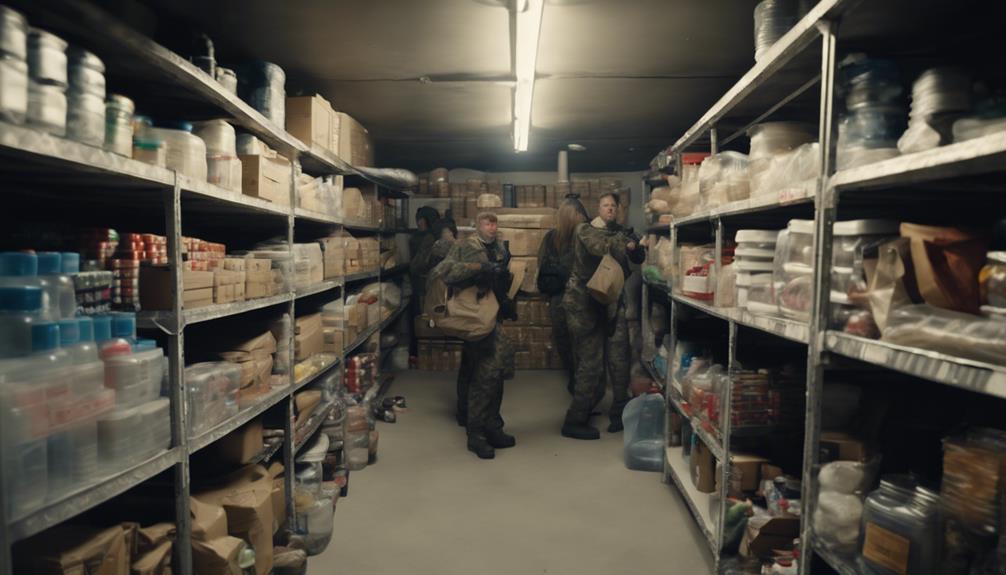When power fails, I focus on staying warm by relying on efficient off-grid heating methods. For instance, I keep a rocket stove handy, which burns wood effectively and provides warmth for hours. I also make sure to store dry wood beforehand, so I'm prepared for any emergency. It's crucial to have skills like fire starting and cooking without electricity to maintain comfort and well-being. Besides, building a network with neighbors enhances our collective resilience. Understanding these strategies can make a significant difference in staying warm. There's more to explore about how to prepare effectively for power disruptions.
Key Takeaways
- Utilize efficient off-grid heating methods like rocket stoves or TLUD stoves for warmth during power outages.
- Keep a supply of dry wood ready to ensure consistent heating when electricity fails.
- Engage with your community to share resources and knowledge for enhanced preparedness.
- Master fire-starting techniques and maintain fire-starting tools to ensure reliable warmth and cooking options.
Understanding Power Grid Vulnerabilities
Understanding the vulnerabilities of our power grid is essential, especially with threats like solar storms and cyber warfare looming over our tech-dependent lives.
I often think about how a Carrington-level solar storm could disrupt everything we rely on. NASA estimates a 12% chance of such an event this decade, which is alarming. The near miss in July 2012 showed us just how precarious our systems can be; we could have faced a decade-long grid shutdown.
It's not just solar storms, though—cyber attacks and natural disasters also pose serious risks. I realize that being aware of these threats pushes me to contemplate how I can prepare for a potential grid failure, ensuring I'm not left in the dark when disaster strikes.
Essential Off-Grid Heating Methods
When the power goes out, having reliable off-grid heating methods becomes essential for staying warm and comfortable. I've found a few effective options that really make a difference.
First, I like using a rocket stove; it burns wood efficiently and keeps my space warm for hours.
Another great choice is a TLUD stove, which can utilize various biomass fuels, making it versatile.
For those in smaller spaces, I recommend a Hunter Model stove, designed specifically for compact areas and with proper smoke ventilation. The Hunter Model stove is not only efficient but also ensures safety for indoor use, providing warmth without compromising air quality. Its user-friendly design is perfect for individuals who may lack experience with traditional wood stoves or those who want to avoid the complexities of learning *how to build a campfire*. With its compact size and easy maintenance, it’s an excellent choice for cabins, tiny homes, or even workshops.
I also keep dry wood on hand for easy access during emergencies.
These methods not only help me stay warm but also guarantee I'm prepared for any situation that might arise when the power fails.
Cooking Without Electricity

Having reliable heating methods like rocket and TLUD stoves prepares me for cooking without electricity, ensuring I can still whip up meals even during power outages. These stoves are efficient and use minimal fuel, allowing me to focus on cooking instead of sourcing wood.
Here are four key benefits of cooking off-grid:
- Fuel Flexibility: I can use various biomass materials, from twigs to pine cones.
- Low Smoke Production: These stoves minimize visibility and smoke, making cooking discreet.
- Portability: Lightweight options like the Economy Scout Stove are easy to transport.
- Long Burn Times: Rocket stoves can burn for up to 16 hours, providing ample cooking time.
With these tools, I'm ready to tackle any cooking challenge during a power failure.
Importance of Community Preparedness
Community preparedness plays an essential role in ensuring we can support one another during emergencies and power failures.
I've realized that when we come together as a community, we strengthen our resilience. Sharing resources, knowledge, and skills makes a significant difference in how we face challenges.
I often discuss strategies with my neighbors, and we plan for various scenarios. This exchange of ideas not only helps us gather supplies but also builds trust and camaraderie.
I know that in times of crisis, having a network of like-minded individuals can provide emotional support and practical assistance.
Skills for Survival Scenarios

Building on our community discussions, I've come to realize that mastering practical survival skills is vital for maneuvering through emergencies effectively.
These skills can make a significant difference when the power fails and resources are scarce. Here are four key skills I believe everyone should focus on:
- Fire Starting: Knowing multiple methods to ignite a fire is essential for warmth and cooking.
- Water Purification: Being able to safely purify water guarantees hydration and health.
- First Aid: Understanding basic first aid can save lives in emergencies.
- Shelter Building: Building a temporary shelter protects against the elements.
Efficient Fuel Sourcing Tips
Sourcing fuel efficiently can make a significant difference when facing power outages and limited resources. I've found that local cabinet shops and construction sites often have wood scraps available for easy collection. I simply ask foremen if I can take some to help them reduce cleanup efforts.
Additionally, I make certain to store dry wood ahead of time, which pays off during emergencies. For starting fires, I've had great success with fatwood from old pine stumps or using cotton balls and matches. I also keep a stash of various fire-starting tools handy.
Strategies for Long-Term Resilience

Resilience in the face of long-term challenges requires a proactive approach to skill development and resource management. I've learned that focusing on specific strategies can make all the difference:
- Cultivate Survival Skills: I prioritize learning practical skills like fire-making and foraging.
- Build Community Networks: Sharing knowledge and resources with others enhances our collective resilience.
- Diversify Resources: I stockpile various fuels and cooking methods to prepare for unpredictable situations.
- Practice Flexibility: Adapting to changing conditions helps me stay prepared for any power failure.
Frequently Asked Questions
What Are the Best Ways to Insulate My Home for Winter Preparedness?
I prioritize sealing drafts with weather stripping, insulating windows with thermal curtains, and adding rugs for extra warmth. I've also insulated my attic and walls, ensuring my home stays cozy during winter's chill.
How Can I Safely Store Fuel for Off-Grid Heating?
I store fuel for off-grid heating by keeping it in a cool, dry place, using airtight containers, and avoiding direct sunlight. I also label everything clearly to guarantee I know what I have on hand.
What Are the Signs of Hypothermia to Watch Out For?
I know hypothermia seems rare, but it can happen quickly. I watch for signs like shivering, confusion, or slurred speech. Staying alert and prepared helps me act before it escalates into a serious situation.
How Can I Create a Home Emergency Heating Plan?
To create a home emergency heating plan, I prioritize alternative heating sources, gather supplies like blankets and fuel, and guarantee I know how to use my equipment efficiently. Preparation makes all the difference in emergencies.
What Low-Cost Materials Can I Use for Emergency Insulation?
I've learned that using bubble wrap can reduce heat loss by up to 50%. I plan to use inexpensive materials like blankets, cardboard, and old clothing for emergency insulation to keep my space warmer during crises.
Conclusion
As I reflect on my journey toward self-sufficiency, I realize that staying warm during a power failure isn't just a matter of having the right tools—it's about embracing a mindset of preparedness.
So, when the winds howl and the lights flicker, will you feel secure in your ability to adapt?
With the right knowledge and community support, we can transform uncertainty into resilience, ensuring our homes remain havens of warmth and comfort, no matter what challenges arise.










